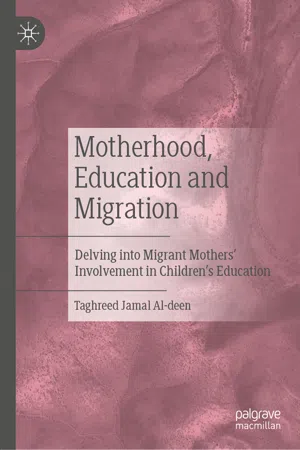This book tells the story of a group of Muslim Iraqi mothers who, under harsh economic circumstances and/or war, left their native country to find refuge and settlement within Australia. This move transcended mere geographical relocation, as these women found themselves as a homogenised, racialised religious minority within a diverse demographic. With this came various challenges, whereby the social structures underpinning the mothering values that they had grown accustomed to became dismantled as they encountered a new culture in which these orientations are questioned. This book seeks to elucidate the interrelationships of immigration, ethnicity and religion, upbringing and the Australian education system, to bring understanding to the complexity of a parent’s involvement in the education of their children. In light of the current migratory and neoliberal climate, and the consequential ever-growing multiculturalism within Australia, it is integral to forge innovative approaches to fostering educational equality for the following generations.
The mothers’ story has been influenced by my own story as an educator and a migrant mother of three children currently attending university and secondary schools in Australia. As an educator, I began my teaching career in Australian schools as a casual relief teacher in primary and secondary, public and private (Islamic schools) as soon as I finished my graduate diploma in education. I then worked as an adult ESL teacher at Adult Migrant English Service (AMES) and Technical and Further Education (TAFE) institutes. Like many other migrant mothers, I entered Australia under the family and humanitarian program after I finished my university degree in Iraq. As a parent, I connected with school education through my three children, as well as through my work as a casual relief teacher in schools, although I stopped working as a teacher a few years ago. As my first child progressed through primary school, I found myself increasingly drawn into frequent conversations about children’s education with other parents both within my ethnic community and outside the community. These discussions occurred anywhere that parents gathered—cultural gatherings, playgrounds, school gates, visits to friends’ homes, at work during coffee and lunch breaks. I found the conversations fascinating, not only because I too am a parent thinking about my children’s education but also because it seemed to me that these discussions were implicated in a much bigger agenda.
My own experience as a migrant mother who has been heavily engaged in her children’s schooling, as I perceive myself, has led me to considerable self-examination about my own role as a parent in my children’s education. Through my interactions with Iraqi migrant parents, particularly mothers, I have realised that most of them are not effectively 1 involved in the schooling of their children. This may be reflected in their children’s low academic achievements, high rates of high school dropouts and lack of access to higher education opportunities and future careers. However, some migrant Iraqi children equal or surpass the dominant cultural group, academically.
As I engaged in these conversations and listened to the mothers’ concerns about their children’s education, I became increasingly interested in the phenomena of concern within my community and my personal interest turned into a professional one. These concerns raised questions around parental involvement or lack thereof in a child’s education: Why are some parents heavily and effectively involved in their children’s schooling and able to gain the benefits of education for their children’s while some are not? What may facilitate or limit parental involvement?
The Text on Parental Involvement in Children’s Education
When I came to research parental involvement in children’s education and home–school relationship, I found that in most sociological studies there was rarely a recognition of the different roles mothers and fathers undertake in their children’s schooling. These differences have been ignored in the policy and literature of home–school relations and literature on parental involvement in their children’s education at home and school. Even though the acknowledgement of gendered responsibility has increased in relation to literature on children and schools, the use of ‘the term, parent’ in the home-school and parental involvement literature not only disguises this gendered nature of responsibility but also the fact that this responsibility affects women’s roles in other areas of their lives (Cole, 2007, p. 169). Helen Proctor makes an interesting point in her discussion of the Good Mother and the High School: A View from the 20th Century, where she draws attention to the absence of mothers in historical documents, beyond their role in procreation, housewifery and the period of child-rearing preschool. By not ‘ever really [being] placed at the centre of the frame’, the ‘schooling mother’ Proctor (2010, p. 113) was, therefore, not only subsumed in the term ‘parent’, as above, but not present at all and, by this exclusion, her involvement is absent and valueless.
In addition, texts on parental involvement focus on class stratification and unequal access to forms of economic, social and cultural capital. It is common for researchers studying white middle-class and working-class families to adopt a general definition of social class where class is divided according to income, academic qualification, professional jobs, taste and lifestyle. This definition may well raise the question of how migrant parents/mothers identify their social class status. Migrants, in particular skilled migrants, once members of the dominant middle class as professionals in their countries of origin, become taxi drivers, trolley pushers, fruit pickers or, if a woman, often homemakers, after migrating.
Many studies involving class analysis and ethnic minority parents and students show that race/ethnicity adds an ever-present layer of complexity to social class positions that deserves further attention (e.g. Archer, 2010; Archer & Francis, 2006, 2007; Brantlinger, 2003; Li, 2008; Modood, 2004; Whitty, 2001). These studies also demonstrate that the range of privileges experienced by middle-class ethnic minority families do not equal those enjoyed by white middle-class families because of structural constraints. Thus, ethnic minority families may not fit easily into prevailing classificatory systems of social class.
This book draws together analysis of social class, ge...
